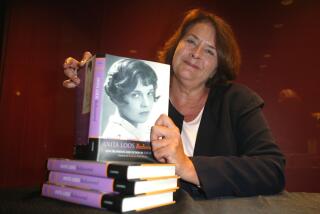‘Beaumarchais’ Wins With Wit, Style
- Share via
“Beaumarchais, the Scoundrel” is a glorious, giddy account of a tumultuous 11 years--1773 to 1784--in the life of the great French playwright. The author of “The Barber of Seville” and “The Marriage of Figaro” led an incredibly busy life as a political gadfly, taking aim at corruption in the ruling classes, serving as a royal spy, helping underwrite the American Revolution, living by his wits and pursuing beautiful women.
The son of a watchmaker, Beaumarchais devised the movement, still used, with which a watch keeps accurate time, and he married his way to the top of the social ladder. (Twice widowed, he was accused by his enemies of doing away with his wives.) He was also a magistrate and a lord of the hunt.
Not surprisingly, the legend of Beaumarchais attracted actor-writer-director Sacha Guitry, himself a legend, who brought to his plays and films a sly, humanizing touch to the lives of royals and other historic figures. No less surprising, director Edouard Molinaro, famed for “La Cage aux Folles” and for many other delightful French comedies, was tantalized by the prospect of filming an unproduced Guitry play on Beaumarchais.
Retaining some 30% of Guitry’s dialogue, Molinaro and his co-writer Jean-Claude Brisville devised an inspired script that’s like a piece of lacy iron filigree--light and fanciful but sturdy--that sparkles with wit while zapping an oppressive monarchist government. In Molinaro and Brisville’s imaginative hands, Beaumarchais emerges as a modern thinker and a prophet of his times, anticipating the American Revolution so soon to come.
Molinaro has said that without Fabrice Luchini he would have never made the film, and unless Guitry had risen from the grave, it is impossible to imagine anyone else in the role of Beaumarchais. That Luchini is slight and unhandsome merely serves to underline the intense magnetism of his wit, intellect and personality. He’s such a commanding presence, his sense of timing and movement so acute, that he actually did steal scenes--or close to it--from Gerard Depardieu in “Colonel Chabert.” Luchini radiates confidence and authority with the throwaway gallantry so characteristic of Guitry himself. He’s a miracle of discipline--and spontaneity.
Bouncing in and out of ladies’ beds and various jails for assaults on the ancien regime, Beaumarchais takes on the corrupt Court of Lords. He wins his case with the public but winds up stripped of his livelihood, his title and the right to stage his plays.
Coming to his rescue, thanks to the intervention of the Prince de Conti (Michel Piccoli), is the king himself, Louis XV (Michel Serrault), who saves Beaumarchais by pressing him into service as a secret agent. He is dispatched to London to retrieve an attack plan on England from a glamorous spy (Claire Nebout), apparently a transvestite.
It is during this mission that he becomes involved with the fast-approaching American Revolution. Gun-smuggling to the colonies, love affairs and other adventures culminate in his staging of “The Marriage of Figaro,” whose premiere has the effect of firing the first shot in the French Revolution.
“Beaumarchais,” filmed gorgeously at Versailles and other historic locales, has that flawless period feel, here enhanced by elegant classical music of the era incorporated into a lovely score, that so many European pictures do so well. It is a film of telling nuance and gesture, none more memorable than a moment when a nobleman, encountering Beaumarchais in the Hall of Mirrors, tries to humiliate him by asking him to repair his exquisite and delicate pocket watch. Ever so deftly Beaumarchais manages to let it tumble from his hands and smash to pieces on the parquet.
* Unrated. Times guidelines: The film contains some sex and nudity.
‘Beaumarchais, the Scoundrel’
Fabrice Luchini: Beaumarchais
Sandrine Kiberlain: Marie-Therese
Manuel Blanc: Gudin
Michel Piccoli: Prince de Conti
Michel Serrault: Louis XV
A New Yorker Films release of a co-production of Telema, Le Studio Canal Plus, France 2 Cinema and France 3 Cinema with the participation of Canal Plus and the assistance of Procirep/Investimage 4/Sofiarp 2. Director Edouard Molinaro. Producer Charles Gassot. Screenplay by Molinaro and Jean-Claude Brisville; inspired by an unpublished work by Sacha Guitry. Cinematographer Michael Epp. Editor Veronique Parnet. Costumes Sylvie de Segonzac. Set designer Jean-Marc Kerdelhue. Composer and music director Jean-Claude Petit. In French, with English subtitles. Running time: 1 hour, 40 minutes.
*
* At selected theaters in Los Angeles and Orange counties.
More to Read
Only good movies
Get the Indie Focus newsletter, Mark Olsen's weekly guide to the world of cinema.
You may occasionally receive promotional content from the Los Angeles Times.






